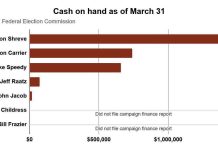
As COVID-19 cases and hospitalizations surge cross the country, public health officials are continuing to face one of the pandemic’s most daunting challenges — convincing people to change their behavior to curb the spread of the coronavirus.
It has been 260 days since the first case of COVID-19 was detected in Bartholomew County, and the pandemic is still upending people’s daily routines and will likely continue to do so for some time.
Schools are closed for in-person instruction, social gatherings have been discouraged, shopping and eating out looks and feels different, events have been canceled and unemployment remains higher than in previous years.
Most cities and states, including Indiana, are now requiring people to wear masks and are urging people to maintain at least 6 feet of distance from people they don’t live with — and large crowds are to be avoided.
[sc:text-divider text-divider-title=”Story continues below gallery” ]
The public health measures reflect the overwhelming scientific consensus that masks and other measures are effective at preventing the airborne transmission of the coronavirus, which has killed at least 65 people in Bartholomew County and sickened more than 3,300.
Yet many people continue to be reluctant to wear masks and adhere to other public health measures — and some people are outright refusing, claiming that virus-related restrictions are overblown, annoying or an infringement of their rights.
“What we’re asking folks to do is change behaviors which are deeply ingrained,” said Darrin Carr, a clinical professor of psychology at IUPUC. “(Behavioral change) takes effort, it takes mental energy, and that’s hard to do.”
Surveys done over the past several months show there is an increasing divide between people who are skeptical of masks and other measures against the virus and those who are following the advice of health experts and are worried about people who are not.
However, more people in the United States report wearing masks than in the spring, though adherence remains far from universal, according to a survey released last month by the Centers for Disease Control and Prevention.
In addition, other recommended behaviors like social distancing and avoiding crowded places have been slower to catch on than mask wearing, particularly among adults ages 18 to 29 years, who generally believed to be at lower risk for — but not immune from — severe illness and death from COVID-19.
Previous surveys from the Pew Research Center suggest that Midwesterners are less likely to follow public health measures against the virus than people in any other part of the country.
"One of the biggest adjustments we have all made during the COVID-19 pandemic is the incorporation of masks and other personal protective equipment into our daily lives," said Melissa Newland, regional manager of crisis and clinic outpatient services at Centerstone. "…These new safety procedures, along with fears of contracting the virus and the overall uncertainty surrounding the pandemic, can trigger anxiety. Some have noted their faces feeling hot and feelings of claustrophobia as their mouths are closed off, or others who experience some respiratory problems."
Human behavior
The reasons why someone may decide not to wear a mask or follow other virus-related measures varies by person and many factors are at play, according to mental health experts.
“Like most human behavior, it’s multiple factors,” Carr said. “It’s not just one thing that you can point at and attribute behavior to. There are multiple psychological, sociological and economic factors that are at work.”
Research in the United States, Europe and Japan over the past few months suggests that certain personality traits, sociocultural factors and economics impact the likelihood that an individual will adhere to prescribed public health measures.
Generally, people who are more conscientious, introverted, agreeable and open to experience are more likely to report that they are wearing masks and following other public health measures, Carr said.
People with lower levels of honesty and humility tend to be more likely to be “rulebreakers” and may ignore health guidance that could keep themselves and others safe, and potentially indicates a lack of empathy for others, Carr said.
A person’s level of patience, social responsibility, tolerance for risk, among other factors are also believed to be playing some sort of role in people’s behavior.
Additionally, people with slightly higher levels of anxiety, which psychologists refer to as “neuroticism,” tend to experience more worry and are more likely to wear a mask, be socially distant and wash their hands.
But too much neuroticism can lead to denial or risky behaviors such as substance use.
“With a personality trait of neuroticism, specifically, there’s probably a sweet spot,” Carr said. “It’s helpful, but too much is not helpful, and too little is not too helpful.”
However, there also may be some cultural factors at work, particularly related to expectations of toughness, according to a recent study by researchers at Illinois State University.
The study found that “greater levels of belief that one should be tough corresponded with greater levels of negative attitudes and lower levels of positive attitudes” toward mask-wearing, Carr said.
“The belief that one should be tough was more influential than other factors, such as education or partisanship,” Carr said, referring the study’s results. “There’s really this cultural expectation, too, I think, that we should kind of suck it up and be tough and not wanting to be seen as not tough.”
The politics of masks
The decision to wear a mask in public also has become a political statement, with opinions on mask-wearing often falling along party lines, according to The Associated Press.
When Americans were asked in August and September to describe how the pandemic had negatively impacted them, “masks” were the ninth most common response among Democrats, according the Pew Research Center.
However, among Republicans and Republican-leaning independents, it was the single most common response.
That resistance is fueled by some of the same people who object to other virus restrictions and feel that directives violate their rights, according to wire reports. The push back has been stoked by President Donald Trump and some other Republicans, who have flouted rules and questioned the value of masks in public statements.
Trump initially refused to wear masks in public and downplayed the severity of COVID-19 but later changed his tune and called it “patriotic” to wear a mask, according to The Associated Press.
No matter the source, the politicization of the pandemic has deeply worried health experts, who say masks and other public health measures should not be a political issue.
The medical and scientific communities largely agree that COVID-19 can only be brought under control through a combination of mask wearing, social distancing and a vaccine.
“I believe the primary issues with mask wearing are that people have made it political,” said Dr. Brian Niedbalski, Bartholomew County health officer. “They have the false belief that masks don’t help, or blindly follow the advice put forth by the president when this pandemic started.”
While political affiliation and the desire to belong to a group may be correlated to some extent with attitudes toward masks, research so far has suggested that cultural expectations surrounding toughness might play a more significant role.
"I think that kind of toughness goes back to the founding of our country in many ways," Carr said. "It’s kind of in the DNA, I think, of our country that we be rugged individualists."
Mental health burden
The continuing divide over masks and other public health measures comes as local health experts express concern that the pandemic is fueling a mental health crisis that could overwhelm providers and leave behind a long-lasting impact on society.
Local mental health professionals have been seeing and increasing number of people seeking help for depression, anxiety, alcoholism marital issues and hardships caused by the pandemic.
They fear that the mental burden of the pandemic could lead to more suicides, substance abuse and even cardiovascular disease and diabetes.
Family Service Inc., a mental health agency that offers counseling services located at 1531 13th St., reported increases in the number of clients seeking help for suicidal ideation, anxiety and depression earlier this year.
Centerstone, 720 N. Marr Road, also has seen an increase in demand, receiving 6,000 calls from people seeking mental health services in October — the largest call volume to date — compared to 2,500 calls in March, Newland said.
“November to date has already experienced over a 50% increase in usual calls,” Newland said.
As the pandemic stretches into the winter, there also are concerns that "pandemic fatigue" may intensify during the colder months, said Lynn Pittman, a licensed clinical social worker at Sandcrest Family Medicine.
"At least in the summer, people were able to get out and ride their bike or walk around the block and things like that where they can at least get some fresh air," Pittman said. "When it’s colder (they may) be more hesitant to do that."
Carr said a possible solution to increase public adherence to public health measures might include targeted messaging based on demographics and behavior much like the "modern techniques we use to sell widgets."
"We’ve developed a messaging infrastructure that has been driving our economy in a significant way for the past 15 years," Carr said. "I think that seems to be a certain logical solution."
— The Associated Press contributed to this report
[sc:pullout-title pullout-title=”COVID-19 misinformation” ][sc:pullout-text-begin]
The Collaboratorium for Social Media and Online Behavioral Studies at the University of Arkansas-Little Rock tracks COVID-19 misinformation and offers tips on how to identify it.
Visit cosmos.ualr.edu/covid-19 for more information.
Visit cosmos.ualr.edu/misinformation for more information.
[sc:pullout-text-end][sc:pullout-title pullout-title=”Tips on how to ease mask anxiety” ][sc:pullout-text-begin]
Some things you can do to ease your anxiety about wearing masks include:
Regulate your breathing. Regulating your breathing has been proven to ease feelings of anxiety. Try breathing into the count of four, holding to the count of four and then releasing to the county of four. Keep that same number in mind for inhaling, holding and exhaling, and you will be able to easily regulate your breathing.
Think positive. Maintaining a positive mindset about wearing a mask can also help ease anxieties toward it. When two people are near each other, both of them wearing masks results in the lowest possible chance of the virus spreading if one were to have it. Remind yourself that wearing a mask is keeping everyone, including you, as safe as possible from the virus.
Personalize your mask. Personalizing your mask is a fun way to ease mask anxiety. When you personalize your mask, it becomes an accessory rather than just personal protective equipment. Wearing a personalized mask boosts your confidence and allows you to express yourself.
[sc:pullout-text-end][sc:pullout-title pullout-title=”Where to find help” ][sc:pullout-text-begin]
- Centerstone — Provides help with struggling with anxiety and depression related to COVID-19. Contact 1-877- HOPE123 (1-877-467-3123).
- Human Services, Inc. — Provides emergency assistance that is income-based. 4355 E. County Road 600N, Columbus, IN 47203. Contact: 800-296-8026 or (812) 372-8407.
- Indiana National Guard Family Assistance Program — Provides assistance to active duty Guard families or veterans of any branch. 711 N. Pennsylvania St., Indianapolis, IN 46204. Contact: 800-237-2850, Ext. 72694.
- Salvation Army Corps of Bartholomew County — Provides emergency assistance, when funding is available. 2525 Illinois Ave., Columbus, IN 47201. Contact: (812) 327-7118.
- Lincoln Central Neighborhood Family Center — Assistance provided for residents of LCNF service area, only when other assistance is exhausted. 1039 Sycamore St., Columbus, IN 47201. Contact: (812) 379-1630.
- Love Chapel. 292 Center St., Columbus, IN 47201. Contact: (812) 372-9421.
- United Way of Bartholomew County — Can help those in need of assistance connect with other agencies. 1531 13th St., Suite 1100, Columbus, IN 47201. Contact: 2-1-1 or (812) 376-3001.
- Columbus Township Trustee — Provides emergency assistance for township residents. Contact: 812-372-8249. (Columbus City Utilities can also provide contact numbers for trustees of other townships).
[sc:pullout-text-end]




